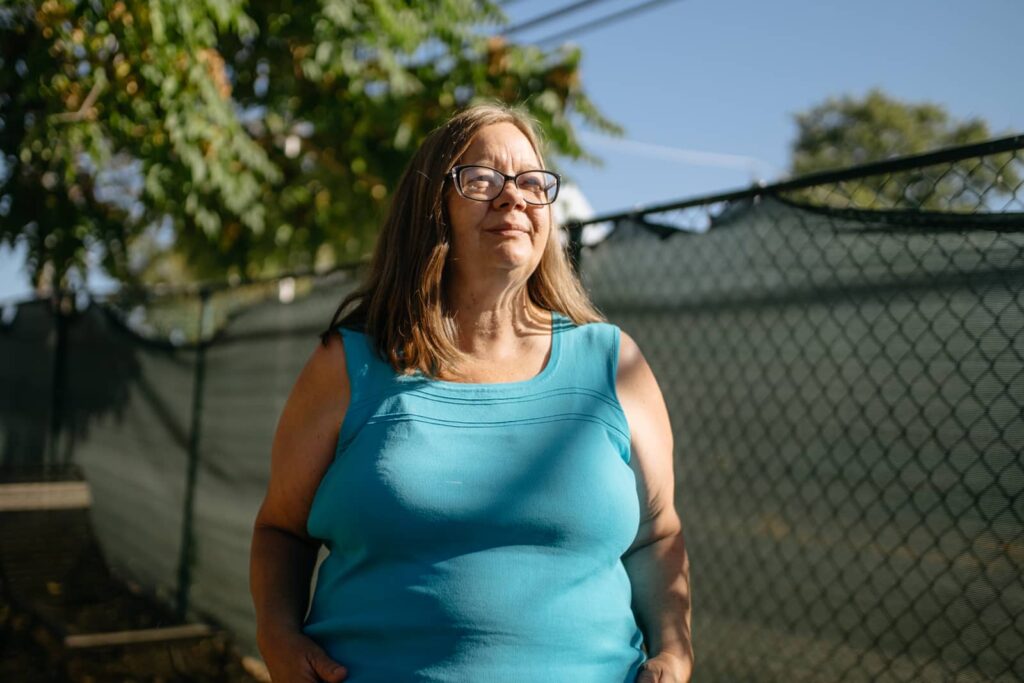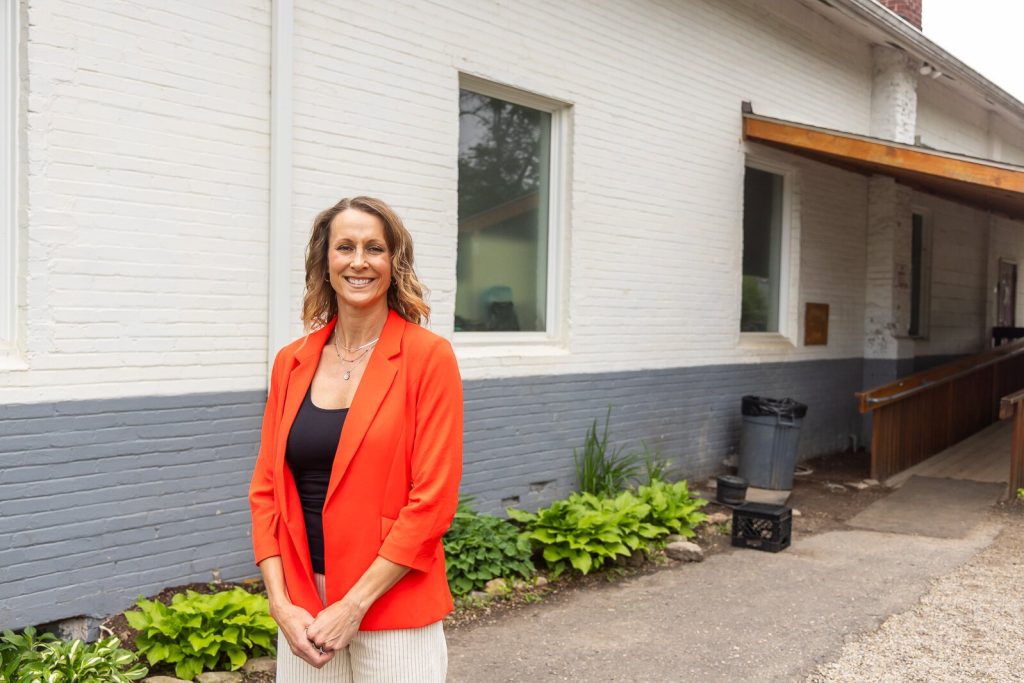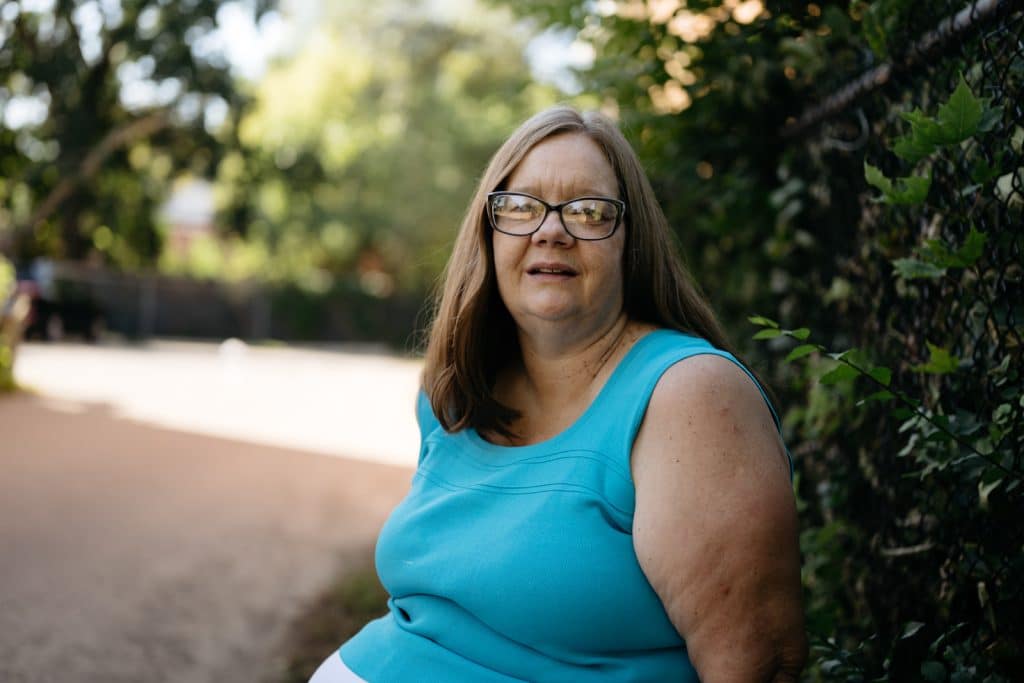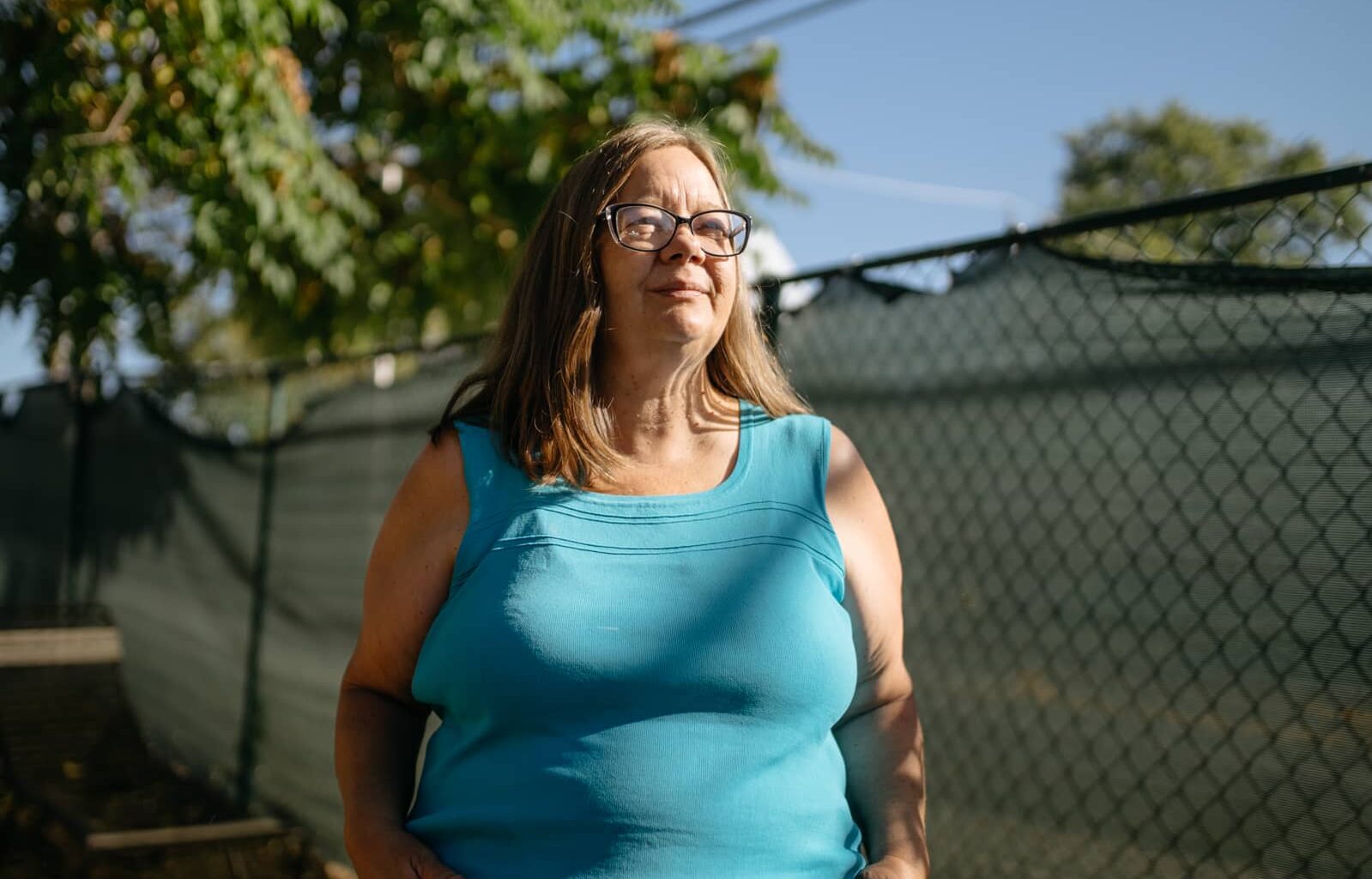 Malinda Gottschalk, 52, is experiencing homelessness for the second time in her life due to medical challenges. Steve Koss
Malinda Gottschalk, 52, is experiencing homelessness for the second time in her life due to medical challenges. Steve Koss
When Malinda Gottschalk lost her home in Holly at age 52, she’d been experiencing intensifying physical and mental symptoms that hadn’t yet been diagnosed as lymphedema. Gottschalk had noted swelling in her ankles and legs for about 10 years at that point. The swelling spread throughout her body, and her condition eventually resulted in brain fog.
“My thinking wasn’t clear,” says Gottschalk, now 58. “I mean, I get ‘A’s and ‘B’s in math, and sometimes I had a hard time mentally doing addition and subtraction at the store. And that’s just not me.”
Gottschalk had worked as an administrative assistant and receptionist, but she’d become too sick to work by the time she lost her home in 2019. A friend took her in, but Gottschalk says that situation “created a lot of friction” because Gottschalk couldn’t work at the time. Her friend kicked her out earlier this year, while Gottschalk had an open wound on her leg oozing lymph fluid that she says “stung like hell.” However, she says that was a “good thing” because it forced her to visit an emergency room, where her condition was finally correctly diagnosed, and to stay at Pontiac-based HOPE Shelters’ Recuperative Shelter.
Now, Gottschalk is on the road to regaining her health, getting a new job, and finding her own housing again. But she says she’s faced unique challenges as an older adult experiencing homelessness, and that those challenges may go unrecognized by the general public.
“I think when people think of homelessness, they think of addictions and maybe mental health issues,” she says. “The age category doesn’t necessarily come in unless you’re thinking about veterans.”
Unfortunately, in Oakland County and many other communities, Gottschalk’s story of homelessness in middle or older age is far from unique. Leah McCall, executive director of the Pontiac-based Alliance for Housing, says her organization works with “a high number of individuals” aged 55 and older.
 Leah McCall. David Lewinski
Leah McCall. David Lewinski
“Nobody thinks of their grandparents or older parents being homeless, and that really is a good population of individuals that we serve that are experiencing homelessness,” she says.
“I never saw it coming”
Older adults may experience homelessness for a variety of unexpected reasons, often related to medical conditions and resulting job loss. Jane Smith, who requested to be referred to by a pseudonym in this story to protect her privacy, is a 58-year-old Pontiac resident who lost her housing seven years ago while she was living in New Baltimore. Smith was blinded in one eye when her next-door neighbor’s boyfriend threw a rock at her through her screen door.
“I never saw it coming,” she says. “No argument, no discussion. He just picked up a rock and threw it at me.”
A University of Michigan graduate, Smith had a successful career as a pharmaceutical salesperson and owned a home, but her injury rendered her unable to work.
“There was no way they were going to hire someone like me [or] give me a company car, knowing I can’t see,” she says. “I’d be a liability to them.”
At the same time, Smith’s then-husband was on a ventilator, in a diabetic coma. When they lost their house, Smith’s husband went to stay with his parents, but Smith didn’t join him because, she says, “we were going to get divorced anyway.” She got a part-time job at Target as soon as she could, but Smith’s minimum-wage earnings weren’t enough for her to pay for her own permanent housing. Over four years, Smith stayed with friends, in motels, in a homeless community in Mount Clemens (where, she notes, “there were a lot of older people”), and eventually at HOPE Shelters’ Adult Shelter in Pontiac.
“I knew nothing about being homeless,” she says. “I didn’t even know where to go.”
McCall says many retirees, as well as older adults with disabilities, are at a heightened risk of losing their homes due to being on a fixed income.
“If rents increase, they can no longer meet that rental rate with the fixed income that they’re on. We see that a lot,” McCall says. “And … if they’re in their own home, they don’t have the funds to keep up their home or pay taxes or utilities that have increased.”
“It just physically gets harder”
Homelessness is difficult for anyone who experiences it, but it can present extra challenges for middle-aged and older adults. McCall says those may include increased susceptibility to medical conditions due to both age and inability to access health care, additional struggles finding new employment, and trouble accessing technology that may be crucial to apply for important social services.
Earl Wise, a 64-year-old Pontiac resident, struggled with accelerating medical challenges during a period of homelessness that lasted from his mid-40s to mid-50s. After losing his job of 22 years and going through a divorce, Wise says he “kind of let [him]self down,” leading to a period during which he was “the lowest [he’s] ever been in [his] life.” Wise lived primarily in abandoned houses rather than homeless shelters so that he would have a roof over his head during the day. However, he says, “winters got rough” on him both physically and mentally.
“I was getting goofy,” he says. “You know, I needed help. I needed some meds at the time because I was getting mental.”
Gottschalk says she’s been “very blessed” overall in her experience with homelessness, but it’s still not easy.
“The body’s just not as young anymore,” she says, adding that she’s glad she hasn’t had to live outdoors. “I’ve seen some people [experiencing homelessness] that are in pretty rough shape, and I know they’re around my age. I don’t know how long they’ve been dealing with it, but it just physically gets harder.”
Even in the midst of these challenges, many older adults experiencing homelessness go to great lengths to hide their situation. Smith says she “went out of [her] way to not look homeless” so co-workers at her part-time job at Target wouldn’t judge her. She carried a backpack of supplies to keep up her appearance and bathe in a restroom on her way to work.
“The people I worked with never knew,” she says.
“They need help”
Middle-aged and older adults experiencing homelessness often need short- or long-term support finding housing, medical care, and other basic needs. Gottschalk lived out of her truck briefly in 2019 before her friend took her in. She says that experience and her current period of homelessness “are like polar opposites.”
“I’ve had so much support this time,” she says, primarily crediting HOPE Shelters staff for helping her through her recuperation. “I’m just so thankful. And I’m thankful that my body is healing.”
 Malinda Gottschalk. Steve Koss
Malinda Gottschalk. Steve Koss
Gottschalk says the support she’s received has sometimes taken the form of someone giving her “a little push.”
“When you’re dealing with new things, it’s not always easy to do,” she says. “But that support’s been there, and it just kind of lifts you up and encourages you to do what you need to do.”
Smith also credits a counselor at HOPE Shelters for helping her get back on her feet. She had struggled to find Section 8 housing, despite having a housing voucher. The counselor helped her get into a permanent supportive housing program through Troy-based Community Housing Network (CHN), which offers clients wraparound services in addition to their housing. Smith now lives in Pontiac, and her rent and utility bills are covered by CHN.
“I just thank [the counselor] to this day, because I was honest with him,” she says. “When they do the intake questions, I used to be embarrassed. But I just told the truth and I qualified for a program.”
Wise also credits CHN for helping him get back on his feet. Staff at CNS Healthcare, where he’d gone to get the medications he needed, connected him to CHN staff, who helped him find an apartment in Pontiac 12 years ago. Wise has since moved into a house, also in Pontiac, and he’s currently saving money to move to Waterford Township.
“I still keep my head above water,” he says. “At least when I look back at the last 10 years, I’m doing a lot better now.”
Since he found new housing, Wise says he’s been able to start working, going to church, and volunteering at local food pantries.
“I feel good when I go pass out food to elderly people because I know I’ve been there,” he says. “… They’re down and out too, but they’re people, you know. Just don’t turn your back on them. They need help.”

